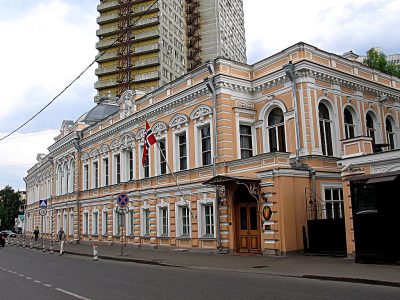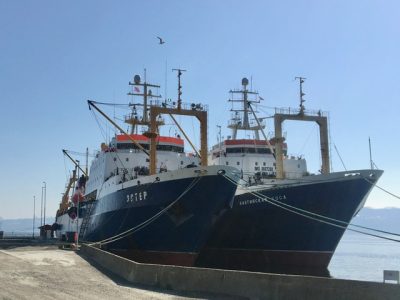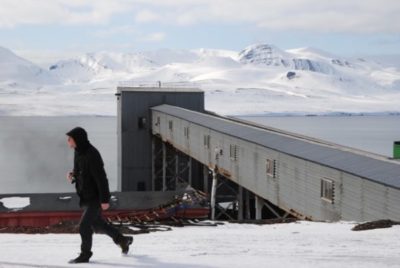The Russian government declared on Wednesday that 10 Norwegian diplomats in Moscow are no longer welcome, meaning they’ll be expected to leave the country quickly. Norway’s foreign ministry in Oslo called Russia’s declaration “an act of revenge” after it expelled 15 Russian diplomats earlier this month for alleged spying on Norway that now appears even more widespread.

“Russian authorities acknowledge that this is a reaction to Norway’s decision to declare 15 staff members at the Russian Embassy in Oslo as unwanted in Norway,” ministry spokesperson Ragnhild Simenstad told state broadcaster NRK. “We view the Russian decision as an act of revenge. All of our diplomats in Russia carry out ordinary diplomatic work. The Russian authorities know that.”
Simenstad noted that the 15 Russians who have now left Norway, meanwhile, were indentified and rendered persona non grata “because the Norwegian foreign ministry believes they have been involved in espionage.” They’re among the latest to be accused of spying as relations between the two neighbouring countries fall to the freezing point.
NRK has been running a documentary over the past week about the extent of Russian espionage in the Nordic region. It reported Wednesday morning that 38 Russian agents have been linked to Nordic embassies, plus Russia’s consul general on Svalbard (see below).
Wednesday’s expulsions of Norwegians in Moscow came as no surprise, with Norway’s ambassador in Moscow Robert Kvile telling NRK that “it would have been a big surprise if they responded in another manner.” Kvile was summoned to the Russian foreign ministry late Wednesday morning, where he was informed that 10 members of his staff would have to leave the country.

He said the meeting was, however, carried out in a “pleasant manner.” No names of those about to be sent home to Norway were revealed but those attached to Norway’s defense attaché in Moscow were mentioned. Despite the reportedly “nice tone” between Kvile and his Russian counterparts, Russian authorities claim he was told that “other measures” will also come, tied to “Oslo’s unfriendly actions.” That may involve limits on recruiting local staffers at the Norwegian embassy. NRK reported that Norway has had 22 diplomats in Russia, 19 of them in Moscow and three at the consulate in St Petersburg.
The looming explulsions thus “cut the (Norwegian embassy) by half,” which will have consequences for the embassy’s work, Iver B Neumann, a researcher and expert on diplomacy at the Fridtjof Nansen Institute, told NRK. “This is unfortunate for Norway.”
NRK, meanwhile, has been running a series of reports compiled in cooperation with the state broadcasters in Denmark, Sweden and Finland to track the extent of Russian espionage in the Nordic region. It’s believed to have been carried out through the use of intelligence gathering, surveillance, maritime patrols and telephone-tapping equipment mounted on the roof of the Russian embassy in Oslo.

The embassy’s roof is littered with parabol antennae, radio masts and even a small building that Norway’s police intelligence agency PST believes are all used to pick up the signals of telephone conversations or determine which mobile phones are in their area. Other Russian staffers, reports NRK, are believed to sit inside the embassy and record conversations their own colleagues have with Norwegian sources.
Russian spies are also believed to be on board Russian fishing boats and so-called “research vessels” sailing along the Norwegian coast and around Svalbard. In one case, NRK reporters for the Brennpunkt documentary series and their Danish colleagues at DR took photos of a man on board one of the Russian research vessels who was heavily armed.
That’s sparked concern from Norwegian politicians, researchers and even officials at the national maritime pilots’ federation. They think Russia is exploiting an agreement that has allowed them to sail freely along the Norwegian coast (and continue to dock in three Norwegian ports), “leaving us much too open and vulnerable.”

Dagfinn Olsen, who’s both a pilot and a Member of Parliament, thinks Norway has been “naive” in also certifying 265 Russians to sail along the coast without requiring pilots on board. “There should be extra demands on those allowed to sail the coast without a Norwegian official on board,” he told NRK.
Researcher Ståle Ulriksen at the Norwegian naval academy (Sjøkrigsskolen) agrees: “We have little control over who is sailing up and down along the coast, and what in fact they’re doing out there.” There also have been a variety of cases in which Russian vessels show up right where NATO is holding military exercises, or where allies are training with submarines. Norway’s extensive offshore oil and gas installations and pipeline network are now being patrolled, but Ulriksen fears the Russians have been charting them for years.
“We shall not be either naive or paranoid,” responds State Secretary Eivind Vad Petersson at the foreign ministry. He noted that pilot requirements were liberalized in 2014 “and now the world has changed.” He told NRK that it’s thus “natural” to review the situation “and we are.”
Petersson wouldn’t offer any concrete examples of what Norway is doing to address the new espionage threat. “Technology has changed, the threat picture has hanged, so we’re not ruling any measure that can protect us better,” he said, “but we must make sure they address the threat.”

Ine Eriksen Søreide was both defense minister and foreign minister during the former Conservatives-led government that had control from 2013 to 2021. She now leads the defense- and foreign affairs committee in Parliament and said she’s not surprised by NRK’s reports that at least 50 Russian ships have been cruising around Norway for the past 10 years. They’ve thus had the time and potential to collect lots of information about Nordic waters and infrastructure.
Other opposition politicians, including Gury Melby of the Liberal Party, want to close all Norwegian harbours to Russian vessels, like most other countries have done around Europe. Prime Minister Jonas Gahr Støre claims Norwegian authorities are following the situation closely.
“We have reacted when we’ve had reason to believe that people are operating under the guise of doing something else,” Støre said after the expulsions earlier this month. He stresses that it remains legal to sail along the coast under international regulations: “We can’t change that, but we can follow the vessels from the air, the sea and digitally, and we are.”
One thing is sure: Relations between Norway and Russia have sunk to a new low, especially after all the diplomatic expulsions now on both sides. “We can debate whether we need to go back to the early 1950s or way back to the (Russian) revolution more than 100 years ago to find worse relations between our neighbour Russia end Norway than what we have now,” researcher Neumann told NRK. “Now we are quite near the bottom.”
NewsinEnglish.no/Nina Berglund

